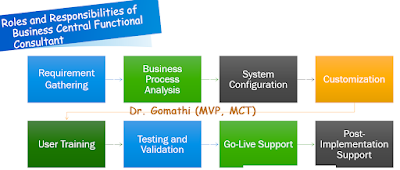Introduction
In the dynamic landscape of modern businesses, the role of a Business Central Functional Consultant is of paramount importance. These experts play a pivotal role in optimizing enterprise operations, streamlining processes, and ensuring successful ERP implementations. With a profound understanding of both business processes and technical capabilities, Business Central Functional Consultants act as key bridge-builders, ensuring that Microsoft Dynamics 365 Business Central aligns seamlessly with an organization's unique needs.
In this comprehensive guide, we will delve into the multifaceted roles and responsibilities of a Business Central Functional Consultant, with a particular focus on a real-life scenario in the manufacturing domain. Throughout this blog, we will explore how these professionals navigate the complexities of ERP implementations, providing insights into their indispensable value.
Here are the key areas we will cover in detail:
Understanding the Manufacturing Landscape
1. Requirement Gathering: The manufacturing industry often involves complex and unique processes. The functional consultant must engage in detailed discussions with key stakeholders, such as production managers, inventory controllers, and supply chain managers. By asking the right questions and actively listening to the client's needs, the consultant gains a deep understanding of their pain points, challenges, and objectives. This enables them to define specific requirements for Business Central to address the manufacturing company's particular needs effectively.
2. Business Process Analysis: During the business process analysis phase, the functional consultant maps out the end-to-end manufacturing workflows, from raw material procurement to finished goods distribution. They identify areas where the current processes may be inefficient or redundant, suggesting improvements that align with Business Central's capabilities. The analysis also involves studying how different departments interact and ensuring seamless integration between them, streamlining the overall manufacturing operation.
3. System Configuration: After comprehending the manufacturing company's requirements and mapping their business processes, the functional consultant proceeds to configure Business Central accordingly. This entails setting up modules, defining data fields, creating workflows, and establishing approval processes that mirror the client's existing practices. The consultant must ensure that Business Central is optimally configured to automate tasks, reduce manual intervention, and improve data accuracy.
4. Customization: Manufacturing companies often have unique processes or niche requirements that demand tailor-made solutions. The functional consultant collaborates with developers to customize Business Central based on these specific needs. This could involve building custom reports, integrating with specialized manufacturing software or machinery, or creating new modules to accommodate industry-specific functionalities. Customizations are designed to enhance the manufacturing company's productivity, efficiency, and competitiveness.
5. User Training: User adoption is critical for any new system implementation. The functional consultant conducts engaging and comprehensive training sessions for employees at all levels of the manufacturing company. Training is customized based on roles and responsibilities, ensuring that each user knows how to utilize Business Central effectively to perform their tasks efficiently. Proper training boosts user confidence, reduces resistance to change, and maximizes the system's benefits.
6. Testing and Validation: To guarantee a successful implementation, the functional consultant conducts extensive testing and validation of the configured system. They perform test scenarios that mirror real-world manufacturing operations, checking if the system responds correctly and meets the desired outcomes. Any discrepancies or errors are identified, addressed, and retested to ensure that Business Central functions flawlessly during actual operations.
7. Go-Live Support: During the crucial go-live phase, the functional consultant is present to support the manufacturing company. They assist users in navigating the new system, addressing any initial hiccups or uncertainties that may arise. The consultant ensures a smooth transition from the old processes to Business Central, minimizing disruption and downtime.
8. Post-Implementation Support: After the system is live, the functional consultant provides ongoing support to the manufacturing company. They continue to work closely with the client, tracking system performance, and addressing any post-implementation issues or enhancement requests. The consultant also keeps the client informed about updates and new features in Business Central, helping them stay up-to-date with the latest advancements.
I invite you to watch the video below for a detailed explanation of Business Central's roles and responsibilities. In this video, I delve into the crucial role of a Business Central Functional Consultant in the manufacturing industry, covering specific tasks, required skills, and how they contribute to successful ERP implementations. Feel free to comment with any questions or specific topics you'd like to explore further!
🎥 Watch the Video: Exploring Business Central Functional Consultants Roles and Responsibilities
Skills required for the various experience-level of functional consultants
- Fresher Functional Consultant
- Domain Knowledge: A basic understanding of
the manufacturing industry and its processes is essential for a fresher
functional consultant. They should be familiar with concepts related to
order processing, production planning, inventory management, and supply
chain operations.
- Communication Skills: Effective
communication is crucial for gathering requirements and interacting with
clients and team members. Fresher consultants need to be good listeners,
articulate their ideas clearly, and ask relevant questions to understand
client needs.
- Analytical Skills: Fresher functional
consultants should possess analytical thinking to grasp complex business
processes, identify areas for improvement, and provide practical solutions
using Business Central's functionalities.
- Learning Aptitude: Being a fresher, the
consultant should have a strong willingness to learn and adapt quickly to
new technologies and ERP systems like Business Central.
- Team Player: Collaboration with other team
members, including technical consultants and project managers, is vital
for successful ERP implementation. A fresher consultant must be a team
player and work well in a collaborative environment.
- Intermediate Functional Consultant:
- In-depth Business Central Knowledge: An
intermediate functional consultant should have a comprehensive
understanding of Microsoft Dynamics 365 Business Central and its various
modules, features, and capabilities relevant to the manufacturing
industry.
- Business Process Analysis: They must have
the expertise to conduct detailed business process analysis, identify
optimization opportunities, and design efficient workflows using Business
Central.
- Customization and Configuration:
Intermediate consultants should be skilled in configuring Business Central
to match specific client requirements. They should also have a basic
understanding of customizing the system using configuration options
without extensive coding.
- Project Management: As intermediate
consultant, they may lead small to medium-sized projects. Hence, project
management skills, including task planning, monitoring, and progress
reporting, become crucial.
- User Training: Intermediate consultants
should be proficient in conducting user training sessions, creating
training materials, and providing ongoing support to users during the
implementation phase.
- Experienced Functional Consultant:
- Extensive Industry Experience: An
experienced functional consultant should have a deep understanding of the
manufacturing industry, including its challenges, trends, and best
practices.
- Advanced Configuration and Customization:
They should possess advanced skills in configuring Business Central and be
capable of handling complex customizations using C/AL or AL language, as
well as extensions.
- Problem-solving and Troubleshooting:
Experienced consultants should be adept at solving complex problems,
addressing issues that arise during the implementation, and
troubleshooting system errors effectively.
- Integration and Data Migration: With more
experience, they should have expertise in integrating Business Central
with other applications and handling data migration from legacy systems.
- Client Relationship Management: As an
experienced consultant, building and maintaining strong client
relationships becomes vital. They should be able to understand client
business goals, suggest improvements, and offer long-term strategic
solutions.
- Continuous Learning: Experienced functional consultants should stay updated with the latest advancements in Business Central and industry trends to provide the best advice and solutions to their clients.
Conclusion:
Ta Ta Bye Bye
Don't forget to leave your comments and suggestions below; we look forward to engaging with you in the comments section and tailoring our content to suit your needs. Together, let's embark on an enlightening journey into the world of Business Central Functional Consulting!














1 Comments
Debo agradecerle por los esfuerzos que ha realizado al escribir este blog. Espero ver el mismo contenido de alta calidad más adelante también. En verdad, tus habilidades de escritura creativa me han inspirado a crear mi propio blog ahora.
ReplyDeleteDynamics 365 Marketing Functional Consultant Associate